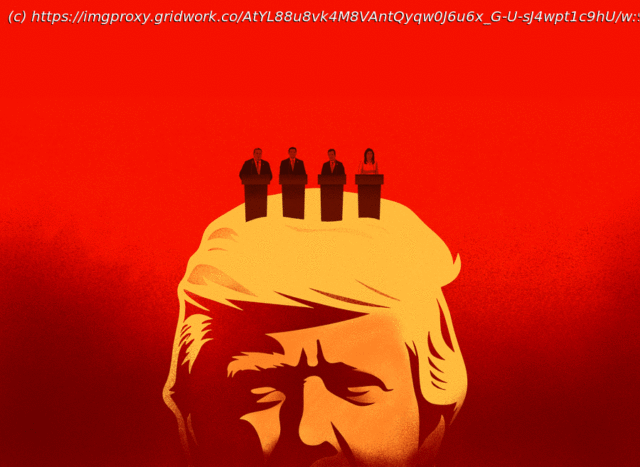Did the Republican primaries even matter?
From its start the Republican presidential primary race has seemed utterly pointless, like a table full of office workmates rehashing where to eat lunch, even as they’re wolfing down what they already decided to eat. With Donald Trump almost certain to win the nomination — in spite of, or because of, spewing Nazi-style vitriol about poisoned national bloodlines and left-wing vermin — and with all of his final-round competitors in lockstep with the MAGA agenda, what is there to say?
Perhaps only this: that Trump has so deeply put his personal stamp on U.S. politics that, even if he were removed from every ballot by a rigorous application of the 14th Amendment, or wound up in jail, or withdrew from the race betting that a pardon from his last remaining rival was a safer way to avoid imprisonment, he would still have won control of his party.
This de facto victory was clear even before the Iowa caucuses, when Ron DeSantis finally departed from his whipped-cur posture to bite the hand that fed him — and with what for teeth? That Trump’s opposition to abortion was insufficiently extreme, that Trump failed to keep his pledge to make Mexico pay for a border wall, that Trump deported fewer undocumented immigrants than Barack Obama — in short, that DeSantis was a better alternative because he would be more Trump than Trump himself.
The fact that the Republican primaries don’t seem to matter is precisely what matters most about them.
If you believe that the healthiest form of two-party politics is dialectic, a principled struggle between antithetical viewpoints that resolves itself on a higher level, then the sickness of U.S. politics in the 21st century might best be described as a lack of dialectic. Nothing like it exists between the parties, and it scarcely exists within one of them. The Democrats can claim some creative tension between their progressive and centrist wings, but you don’t see anything resembling a dialectic among Republicans, and especially among the party’s shrinking roster of presidential candidates. There are outliers like Liz Cheney, true, but they remain outliers, quite often in the sense of being out on their ears. Variations are permissible, but only if they stick to the strongman’s playbook. So it makes sense to find the party’s major presidential candidates (though maybe not its rank and file) most solidly aligned in their support of Israel’s war of wholesale vengeance on Gaza. Even in foreign policy, the domain that interests Trump the least, he defines the ethos: “I am your retribution.”
It was no surprise when Vivek Ramaswamy dropped out of the race at the conclusion of the Iowa caucuses, or that he threw what negligible weight he had behind Trump. Ramaswamy had always seemed a cipher, little more than a stagy medium for conjuring up those specters most frightful to the Right, a textbook example of that entrepreneurial, can-do shtick also found among people who jump off rooftops while flapping their arms.
Yet, for all his seeming insignificance, Ramaswamy could still come closer than any of his second-tier counterparts to appearing on a presidential ticket. Trump’s campaign has already downplayed that possibility, and Trump himself has accused Ramaswamy of being “sly” and a player of “deceitful campaign tricks” — just as he mocked Kim Jong Un as “Rocket Man” before deciding he was his long-lost friend. I would not rule out a similar change of heart toward Ramaswamy. He seems a natural choice for Trump’s running mate: young, corporate, culturally paranoid and possessed of that capacity for abject subordination that Trump perceives as loyalty. Ramaswamy’s lack of votes might actually count as an asset, flattering to Trump’s sense of transcendent impunity: if he can get away with shooting someone dead on Fifth Avenue, he can get away with marching up Pennsylvania Avenue beside an acolyte as electable as a corpse (if only because Ramaswamy’s Indian-American heritage reportedly links him, in some voters’ eyes, with 9/11).
Were Trump to pull this off, the Republican party could lay claim to the most religiously diverse presidential ticket in U.S. history: a Hindu paired with a Christian only a little less committed than Julian the Apostate. Both would bend over backward to appease the Christian nationalists who supported them, while their supporters bent over backward in self-congratulation for their lack of doctrinal prejudice and the laudable openness of their locked-shut minds.
Even if he has no future political prospects, Ramaswamy may still be remembered as having bequeathed his party a stroke of innovative genius very much after its own heart.






